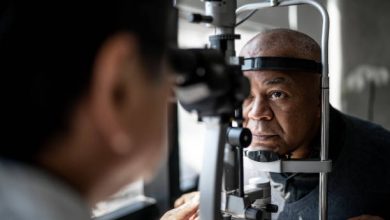How I Overcame Years of Pain & Itch with One Groundbreaking Treatment


Prurigo Nodularis (PN) is a rare and chronic skin condition characterized by painful nodules and relentless itching. For patients many patients, PN can feel overwhelming, impacting every aspect of life.
What is PN?
According to Dr. Shawn Kwatra, M.D., University of Maryland School of Medicine, PN is a severe inflammatory skin disease disproportionately affecting Black Americans. Its hallmark symptom is intense itching, which is often unrelenting and causes significant sleep disruption, anxiety, and depression. This chronic itch can be life-altering, affecting not only a patient’s physical health but also their quality of life.
“Many patients experience psychosocial distress due to the appearance of nodules,” Dr. Kwatra explains, noting that the disease can hinder relationships and erode self-confidence.
“The nodules also tend to be larger in patients with darker skin tones, so many of our Black and African American patients have thicker, fibrotic nodules,” Dr. Kwatra adds.
Eugenia’s Diagnosis: Struggles and Early Symptoms
Eugenia’s journey with PN began in 2017. Her initial symptoms were subtle yet disturbing, mainly manifesting as excessive itching with no clear cause.
“I thought maybe it was something in the environment, but the itching wouldn’t stop,” she recalls. For years, Eugenia endured sleepless nights, her skin becoming hypersensitive to temperature changes.
“In the beginning, it was horrible. The itching lasted for four years straight, every night. The more I scratched, the more I would bleed. It was painful, and I was anxious, thinking I’d have to live like this forever. I had never experienced anything like it,” Eugenia adds.
Like many patients, Eugenia’s PN significantly affected her mental health, with anxiety and depression becoming regular companions.
“I couldn’t wear sleeveless outfits. I kept myself covered because I was embarrassed. One time, I went out because it was so hot in Alabama, but people at the drugstore stared at me like I was an alien. It was humiliating, so I stopped going out,” she shares.
Throughout her journey, Eugenia’s family provided invaluable emotional support. Her husband, siblings, and nephews helped her cope with the daily challenges, even though they couldn’t fully understand the mental anguish PN caused. “They stood by me when I was covered in black nodules all over my body. Their acceptance made life a bit easier, but it was still incredibly hard,” Eugenia shares.
Despite her family’s help, the internal struggle was intense. “I wish I had access to therapy to deal with the emotional impact. There were days I didn’t want to live if this was my future,” she shares highlighting the importance of mental health resources for those living with PN.
A Breakthrough in Treatment: The Clinical Trial Experience
In 2022, Eugenia was introduced to the nemolizumab clinical trial, which has now been approved by the FDA as NEMLUVIO. This became a turning point in her journey. Initially, she had no expectations but was hopeful.
“My sister recommended a dermatology center. The director of dermatology saw my condition and said I’d be a great candidate for a study they were starting. That’s how I found out about the trial,” Eugenia shares.
After the first treatment, she noticed a significant reduction in itching. “At first, there weren’t many changes, but after my first treatment, the itching reduced significantly. It was miraculous. It took over a year for the nodules to start disappearing, but they eventually did. I still have scars, but I’ll take the scars over the itching any day,” she adds.
Dr. Kwatra, who served as the lead principal investigator of the nemolizumab trials, confirmed that such rapid improvements are typical: “One injection can bring a clinically meaningful reduction in itching for 40 percent of patients within weeks.”
Dr. Kwatra explains that for many patients with PN, reducing the itch directly leads to improvements in painful lesions. “Itch is the primary driver of PN. Once we control it, the nodules start to heal, especially for African American patients, who often develop larger, thicker nodules.”
Long-Term Benefits of Nemolizumab
Nemolizumab’s long-term efficacy is one of its most promising aspects. According to Dr. Kwatra, the results of the longest study conducted on PN patients, show sustained benefits over 52 weeks. “Over 80 percent of patients had a significant improvement in itching, and more than 60 percent saw their nodules nearly disappear,” he says. These sustained outcomes are a breakthrough in managing PN, offering patients long-term relief that was previously unavailable.
The Systemic Nature of PN
One of the most important discoveries highlighted by Dr. Kwatra is that PN is not just a skin condition. His research has found that PN involves systemic inflammation throughout the body, not just in the nodules. This insight underscores the need for comprehensive treatment beyond topical solutions. “This is a systemic disease, and understanding that can help us target therapies that stop the entire inflammatory cycle,” he notes.
For patients like Eugenia, this revelation reinforces the importance of seeking early, systemic treatment. “It’s crucial for patients to get on systemic therapy quickly, not just manage the symptoms locally. The sooner we start treatment, the better the outcomes,” Dr. Kwatra advises.
Eugenia’s Life After Treatment
Eugenia’s life has dramatically improved since she began the nemolizumab treatment. Her confidence has returned, and she’s resumed activities she had long abandoned, such as singing at church and attending social gatherings.
“I’m a pastor and a gospel singer, and I had stopped performing. Now, I’m accepting more engagements, and I feel confident wearing what I want, especially in the summer. I’m really excited to be back to doing what I love,” she says.
The Importance of Raising Awareness
Both Eugenia and Dr. Kwatra emphasize the need for greater awareness of PN. It’s often underdiagnosed, especially in communities of color, and many patients suffer in silence, unaware that treatments exist.
“PN is a microcosm of the broader health disparities we see in society. We need to ensure that people, especially in underserved communities, know that there are options available,” Dr. Kwatra notes.
For Eugenia, sharing her story has become a mission. “If I can help just one person avoid the years of suffering I went through, it’s worth it,” she concludes.
If you are newly diagnosed with PN, it’s important to seek medical help early, explore systemic treatments, and never lose hope. With ongoing research and more effective therapies on the horizon, the future for PN patients is brighter than ever.


